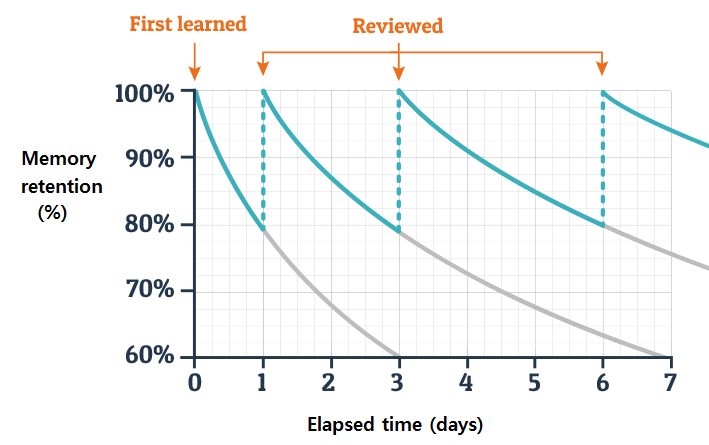Cognitive Science of Learning
Ataraxia - “A state of serene calmness; ataraxia was the ideal mental state for soldiers entering battle.”
Chronic Stress
- Stress affects our ability to remember concepts.
- Increases the connections in the fight or flight part of our brain.
- Thereby weakening the parts of our brain which are used for learning.
- Increases the connections in the fight or flight part of our brain.
Memory

Encoding Memory
- “Encoding is the first stage of memory. It is the process by which the details of a person’s experience are converted into a form that can be stored in the brain.”
- “People are more likely to encode details of what they are paying attention to and details that are personally significant.”
Memory Consolidation
Following encoding, it “refers to the neurobiological process of long-term memory formation.”
Memory Retrieval
- “Retrieval is the stage of memory in which the information saved in memory is recalled, whether consciously or unconsciously. It follows the stages of encoding and storage.”
- “Retrieval includes both intentional remembering, as when one thinks back to a previous experience or tries to put a name to a face, and more passive recall.”
Memory Reconsolidation
- “After a memory is retrieved, it is thought to undergo a process called reconsolidation, during which its representation in the brain can change based on input at the time of remembering.”

Learning in Autism
Predictive Coding Theory
The theory suggests that the brain’s weighting of differences between sensory input and expectations is determined by a parameter called “precision.” When acquiring new knowledge, the brain increases precision to incorporate the input and construct a model. Once the brain deems the model complete, it reduces precision, assuming any further differences are insignificant random variations.
The theory could also shed light on why some students might prefer being introduced to advanced material at a slower pace while simultaneously struggling with simplified introductory concepts. This could be because the simplified concepts may lack the level of detail needed for these students to fully grasp and internalize them.
Delayed Processing
Slow processing refers to taking a longer time to absorb information, potentially leading to falling behind and missing subsequent information. On the other hand, delayed processing involves storing incoming information for later processing, which can occur hours, weeks, or even years after the event.
Individuals with delayed processing may process the minimum needed in real-time while storing the rest for later. It is noted that some individuals who experience delayed processing can recall and process more information than others once they do process it.
The reasons for delayed processing can include slow processing of information or difficulty in handling a large volume of incoming information.
It is important to be aware that individuals who seem to struggle with understanding or following information in real-time may have taken it all in and simply require time for the brain to process it.1
Footnotes
or are dealing with information overload.↩︎
